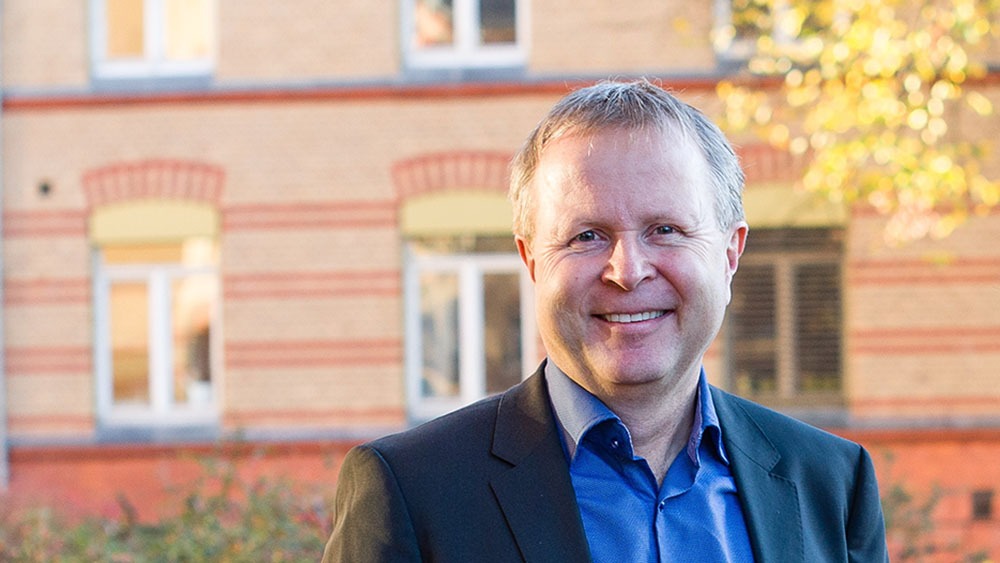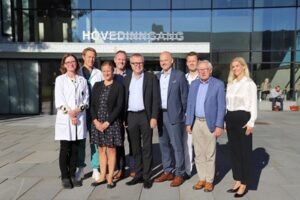K.G. Jebsen Centre for Cardiac Biomarkers

The K.G. Jebsen Centre for Cardiac Biomarkers seeks to answer critical unanswered questions in cardiovascular medicine. The Centre’s goal is to improve understanding of disease mechanisms that cause heart damage and heart failure through studies of established and new biomarkers associated with heart disease, which will lead to better prevention and treatment of these conditions.
The centre aims to identify new methods for assessing the risk of future disease and improve the prognosis for patients with established disease by combining laboratory research with patient centered research and data derived from large population studies.
In the Western world, cardiovascular disease is one of the leading causes of morbidity and mortality. Approximately one-fifth of the Norwegian population lives with or is at high risk of developing cardiovascular disease, and there is an urgent need for new diagnostic methods. We also need more information to forecast how the disease will progress and how effective treatment will be.
Circulating biomarkers are substances found in the blood that reflect disease severity, prognosis, and treatment response. Biomarker analyses will be performed in blood samples collected in large population studies such as the Health Survey in Trøndelag (HUNT) and the Akershus Cardiac Examination (ACE) 1950 study to discover new cardiac markers and disease mechanisms for heart damage. Established biomarkers, such as the heart muscle protein troponin, as well as new biomarkers, will be studied.
The blood contains thousands of different proteins. While it was previously common to analyze only one or a few biomarkers at a time, new methodology, known as proteomics, now allows the analysis of thousands of biomarkers in a small blood sample volume. Proteomics analyses not only help to identify disease earlier and more precisely, but also provide unique insight into the disease process itself. Attack points for future heart failure treatment can thus be identified.
Certain cancer treatments have been linked to an increased risk of heart damage. Cancer can also increase the likelihood of heart damage. However, it is unclear whether the cancer treatment or the cancer itself is more likely to cause heart damage and heart failure. Initiated by investigators in the Centre, participants in the large HUNT survey had heart biomarker measurements performed, which can be used to detect early signs of heart damage and subsequent risk of heart failure. By comparing this information to data from health registers, we can gain a better understanding of the relationship between cancer, cancer treatment, and heart damage. The Centre will also test new treatment strategies in order to prevent heart damage after cancer treatment.
The Centre will also investigate the link between genetic factors and the risk of scar tissue formation in the heart, a condition known as cardiac fibrosis. Fibrosis is one of the most important pathophysiological changes in a failing heart and has a bearing on prognosis.
The Centre will collaborate closely with leading international heart disease research groups, its own international scientific advisory panel, and its own user panel of patients with established heart and vascular disease, as well as Norwegian business in biotechnology research and innovation.
The Centre, which is anchored at the Department of Clinical Medicine at the University of Oslo and is led by Professor Torbjørn Omland, was established on September 1, 2022, as the first located at Akershus University Hospital.
The K.G. Jebsen Centre for Cardiac biomarkers is funded by the Foundation K.G. Jebsen, the University of Oslo and Akershus University Hospital.
Centre leader, professor I, University of Oslo
Deputy leader, professor II, University of Oslo
Associate Professor, University of Oslo
Associate Professor, University of Oslo
Professor II, University of Oslo
Associate professor, University of Oslo
MSc
The centre in the media
- University of OsloOpening of the K.G. Jebsen Centre for Cardiac Biomarkers01.03.2022
- University of OsloNew Jebsen Centre for Cardiac Research01.03.2022
The Centre in brief
Leader: Torbjørn Omland
Centre period: 2022 – 2027
Host institution: University of Oslo
Funding: 22,5 MNOK
Contact information
K. G. Jebsen Centre for Cardiac Biomarkers
Visiting Address:
Akershus University Hospital

From the left: associate professor Siri Lagethon Heck, associate professor Peder Langeland Myhre, professor II Ida Gjervold Lunde, professor Helge Rørvik Røsjø, professor og centerleader Torbjørn Omland, Sveinung Hole (CEO Stiftelsen Kristian Gerhard Jebsen), associate professor Magnus Nakrem Lyngbakken, Stener Kvinnsland (member of scientific committeee, Stiftelsen Kristian Gerhard Jebsen), centre coordinator Anett Hellebø Ottesen. Photo: Anne Wikdahl Haga, Ahus.
